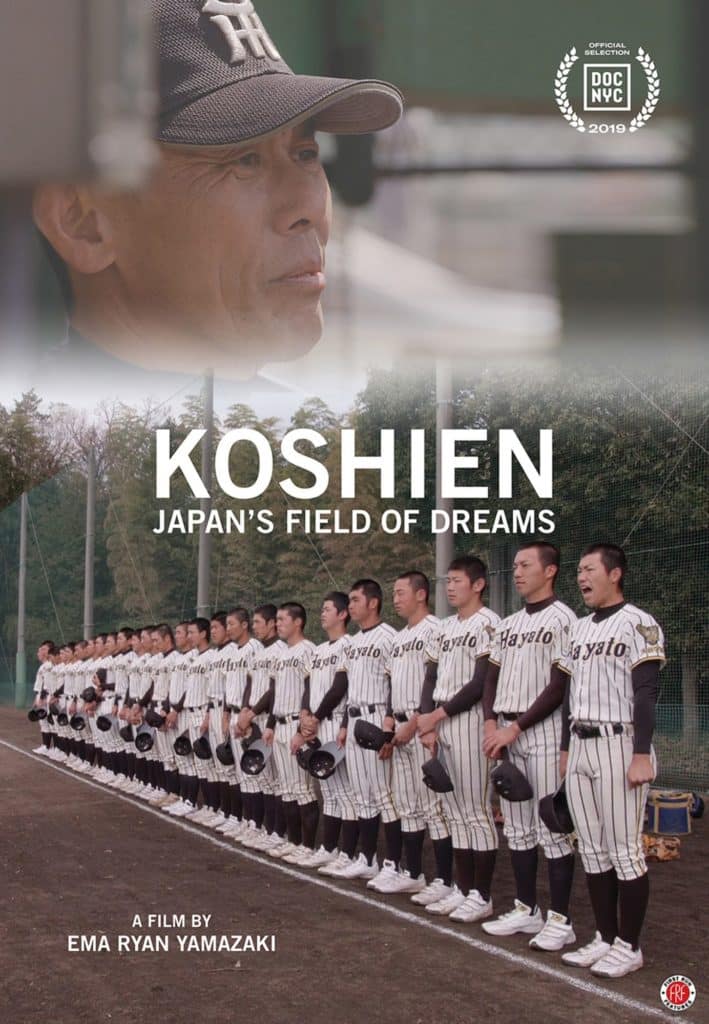
Hopefully, you have learned by now that Americans are not the only ones wild about baseball. In Japan, baseball is a cultural obsession that dates back to the 19th century. Perhaps the most emblematic display of Japan’s fanaticism for baseball is the annual National High School Baseball Tournament, commonly known as “Koshien.”
“It’s the Super Bowl and March Madness combined,” says director Ema Ryan Yamazaki, whose film, Koshien: Japan’s Field of Dreams, premiered at the 2019 DOC NYC festival and became available nationwide in the United States and Canada on November 20.
In the film, Los Angeles Angels MLB superstar and Koshien veteran Shohei Ohtani adds, “It’s like our World Series.”
So, what exactly is Koshien?
During the tournament’s prefectural qualifiers, 4,000 high school baseball teams compete for a mere 49 slots in the finals at Koshien Stadium. The whole tournament is a riveting single-elimination format, and the finals draw in over 50,000 fans to the stadium daily. Millions more are glued to their screens across the country, many of which who wouldn’t even call themselves baseball fans. “Today, people are too busy to visit their family grave. Watching Koshien connects them to their hometown,” says high school coach Tetsuya Mizutani in the film.
Koshien is such big deal that the stadium’s Nippon Professional Baseball (Japan’s MLB equivalent) home team, the Hanshin Tigers, are forced to play elsewhere when the NPB seasons conflicts with Koshien.
But Koshien is not just a spectacle for fans – it’s also a professional scouting hotspot. MLB stars such as Hideki Matsui, Daisuke Matsuzaka, Yu Darvish, Masahiro Tanaka, and Ohtani – in addition to countless NPB stars, all got their start in Koshien.
Yamazaki’s film, Koshien: Japan’s Field of Dreams, not only educates the viewers about this national phenomenon but also tells an impassioned story through players, fans, and in particular, two coaches, Hiroshi Sasaki of Hanamaki Higashi high school and Tetsuya Mizutani of Yokohama Hayato high school.
Hiroshi Sasaki is the younger, hipper, of the two, and is also the former coach of Ohtani and Seattle Mariners pitcher Yusei Kikuchi. Sasaki is also a bit of a philosopher. One of the most illuminating segments in the film is when Sasaki compares his players to that of his beloved bonsai plants that he raises in the foul area of right field. Sasaki explains how he uses support wires so their branches can grow into a beautiful shape, but he must eventually remove the wires to allow them to grow strong on their own.
Sasaki is vying for this 10th Koshien appearance.
Tetsuya Mizutani couldn’t be more different. Mizutani is a hardened veteran with old-school methods. “I want to remain a stubborn man of the 20th century,” he says. Mizutani has his players focus on respect, cleanliness, and unity; whereas Sasaki values individualism. Mizutani teaches his players how to enunciate and speak politely; he also makes them pick up trash wherever they go. A clear example of Mizutani and Sasaki’s contrasting methods is when we witness Mizutani adjusting a player’s batting stance by moving the player’s shoulders with his hands whilst Sasaki shows his player how to correct his stance with an app on his phone. But perhaps Mizutani’s tried and true methods need an update; Mizutani has only reached Koshien once, a decade ago, and that was only after eighteen years of pursuing it. For Mizutani, achieving Koshien is life. He admits that he is rarely home, neglects his wife, and has never even seen his soon-to-be-a-high schooler son play baseball.
There’s an important detail that adds to the narrative tension in the film: Mizutani is Sasaki’s former mentor. But this is not a story that follows the good vs. evil trope; instead, it’s a tale of mentor vs. disciple, old vs. new, tradition vs. innovation.
Neither Hanamaki Higashi nor Yokohama Hayato has ever won Koshien.
As the 100th annual Koshien tournament nears, Ema Ryan Yamazaki focuses her camera on these two teams as we watch them gush literal blood, sweat, and tears to arrive at Koshien. Like Americans, most players will not continue playing baseball after high school, so this their last shot at glory before they hit the books and eventually enter the soul-crushing work ethic of a Japanese “salaryman” and blend into the background.
Being Japanese born, educated in New York, and raised by a British father, documentarian Ema Ryan Yamazaki is the perfect person to tell this story. She is able to provide a unique perspective on an event that’s through-and-through Japanese, but rooted in the ol’ stick and ball game from New England.
Koshien: Japan’s Field of Dreams knocks it out of the park, and just like the tournament, it can be thoroughly enjoyed by baseball fans and non-baseball fans alike.
Ema Ryan Yamazaki appeared on our “Chatter Up” speaker series. Click here to read the episode recap and see the full episode via the YouTube video above.
Stream the film here (and support JapanBall in doing so because we receive a small commission).
The director’s website: https://www.emaexplorations.com/en/
For more from JapanBall, check out our Articles and Features section!


4 comments
Great and interesting review
Great and interesting review
This is an amazing documentary! I really loved it, and wish it was available for purchase on a physical blu-ray with some commentary tracks.
Agreed!